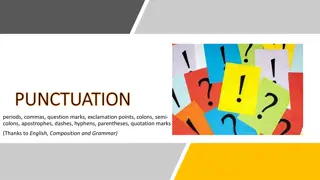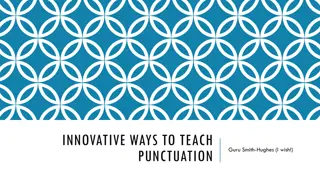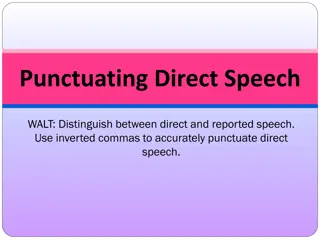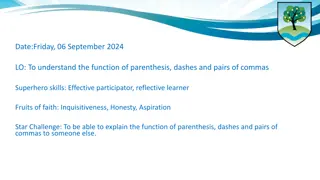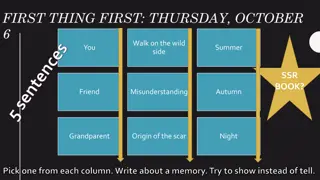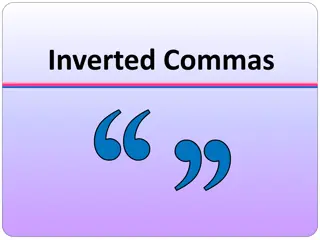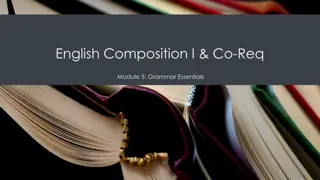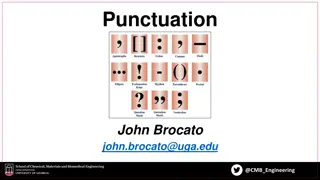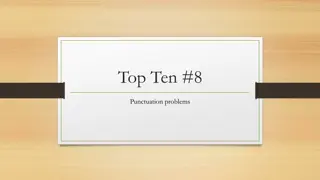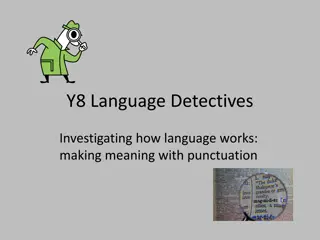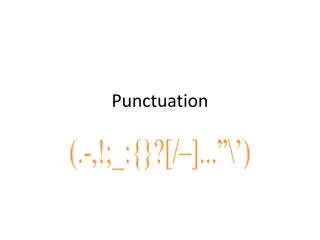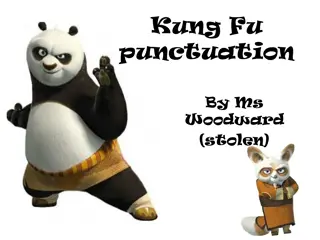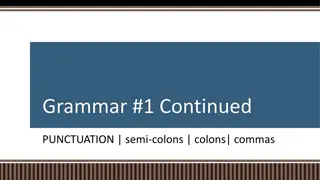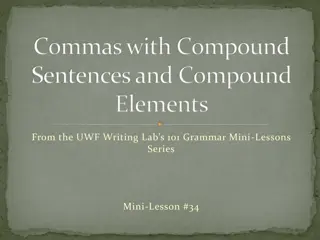Mastering Commas: Seven Simple Rules for Correct Punctuation
Learn the essential rules for using commas correctly with these seven simple guidelines. From using commas after introductory clauses to separating items in a list and before FANBOYS, this guide provides clear examples and explanations for each rule. Understand when to use commas after transitional words or phrases and how to correctly separate direct quotes from tags. Improve your writing skills and punctuation accuracy with this comprehensive comma usage guide.
Download Presentation

Please find below an Image/Link to download the presentation.
The content on the website is provided AS IS for your information and personal use only. It may not be sold, licensed, or shared on other websites without obtaining consent from the author.If you encounter any issues during the download, it is possible that the publisher has removed the file from their server.
You are allowed to download the files provided on this website for personal or commercial use, subject to the condition that they are used lawfully. All files are the property of their respective owners.
The content on the website is provided AS IS for your information and personal use only. It may not be sold, licensed, or shared on other websites without obtaining consent from the author.
E N D
Presentation Transcript
COMMAS: SEVEN SIMPLE RULES Rule 1: Use a comma after an introductory clause in a sentence: After I ate dinner, I went for a long walk. While Dahlia was in Canada, she noted its pristine coasts. Consequently, she travels there often. Try these: As a result of her long day at the office she canceled her dinner plans. Surprisingly John stayed at the luncheon for several hours. Because of the new tax law accountants are working twice the hours they worked last year at this time.
COMMAS: SEVEN SIMPLE RULES Rule 2: Use a comma to separate more than two items in a list. She received her bachelor s degree from UCLA, her master s degree from USC, and her doctorate from UC Berkeley. Try this: David willed his oldest nieces all of his property houses and warehouses. David willed his oldest nieces all of his property, houses, and warehouses. Langston Hughes poetry focuses on racial pride social justice and the diversity of the African American experience. Langston Hughes poetry focuses on racial pride, social justice, and the diversity of the African American experience.
COMMAS: SEVEN SIMPLE RULES Rule 3: Use a comma before a FANBOYS* that separates two complete sentences. *FANBOYS = For And Nor But Or Yet So He studied for months, so he passed the comprehensive exam. (Note the subject in each sentence) But no comma is needed when there are NOT two complete sentences: He studied for months and passed the comprehensive exam. Try this: Serena created a new software application and it will be available for purchase by next month. A good manager controls expenses and invests surplus dollars.
COMMAS: SEVEN SIMPLE RULES Rule 4: Use a comma after a transitional word or phrase: Rule 4: Use a comma after a transitional word or phrase: however, likewise, therefore, in fact, furthermore, in addition, nevertheless, meanwhile, indeed therefore, in fact, furthermore, in addition, nevertheless, meanwhile, indeed however, likewise, Dr. Johnson reiterated her point Dr. Johnson reiterated her point; as a result, issue. issue. ; as a result, her students clearly understood the her students clearly understood the Try this: John did not understand their language moreover he was unfamiliar with Try this: John did not understand their language moreover he was unfamiliar with their customs. their customs. John did not understand their language John did not understand their language; moreover, customs. customs. ; moreover, he was unfamiliar with their he was unfamiliar with their
COMMAS: SEVEN SIMPLE RULES Rule 5: Use a comma to separate a direct quote from its tag : She said, The event wasn t memorable. The event wasn t memorable, she said. Try this: Jack is so forgetful that he hardly remembers his name Melissa said. Jack is so forgetful that he hardly remembers his name, Melissa said.
COMMAS: SEVEN SIMPLE RULES Rule 6: Use a comma after a clause with nonessential (nonrestrictive) information and appositives, which rename a nearby noun. Ed s house, which is located on 13 acres, is 5,000 square feet. If you were to delete the nonrestrictive clause, the sentence s meaning would not change; the nonessential clause is considered additional information. Darwin s most important work, On the Origin of Species, was the result of many years of work.
COMMAS: SEVEN SIMPLE RULES Rule 7: Use commas to Rule 7: Use commas to express contrast express contrast or or set off words and phrases. set off words and phrases. Unlike Robert, Unlike Robert, Cecilia loved dance contests. Cecilia loved dance contests. The Epicurean philosophers sought mental The Epicurean philosophers sought mental, not physical , not physical, pleasures. , pleasures. Forgive me Forgive me, Angela , Angela, for forgetting your birthday. , for forgetting your birthday. Yes, Yes, the loan will be approved. the loan will be approved.
LETS PRACTICE . . . Einstein was more interested in breaking not following the rules. No he did not file the report. Susan what was the most compelling idea in the film? In contrast to the public school system private schools may not always have a standardized curriculum.
LAY AND LIE Lay: To place an object on something. Always requires a direct object Please lay the book on the desk. Past tense of lay: Laid: He laid the invitation on her desk. Lie: To put oneself horizontal. When I m sleepy, I lie on my sofa. Past tense: Lay: While I had the flu, I lay in bed all day. Jeff (laid, lay, lie) his cell phone somewhere and cannot find it. Grandpa (lay, laid, lie) the baby in the crib.
CAPITALIZATION OF DEGREES When using the full title of a degree or the abbreviation, capitalize the first letter of each significant word: Bachelor of Arts or B.A. or BA Master of Science or M.S. or MS Doctor of Education or EdD Doctor of Philosophy or PhD However, without the full title, do not capitalize: I received my doctorate from Pepperdine, my master s degree from USC, and my bachelor s degree from UCLA.
COMMON ERRORS: PRONOUN REFERENCE A pronoun replaces a noun and must agree in number and gender with the noun it s replacing. Incorrect: Everyone is studying hard for their exams. Correct: Everyone is studying hard for his or her exams. Correct: All of the students are studying hard for their exams. It s always best to make a subject plural and use a corresponding plural pronoun.
COMMON ERRORS: FAULTY PARALLELISM What s wrong with the following sentence? Jasmine enjoys hiking, swimming, and to run. Parallelism: All parts of a sentence that are parallel in meaning must be in parallel form. Jasmine enjoys hiking, swimming, and running. We must either raise revenues or it will be necessary to reduce expenses. Annie s dress was old, faded, and it had wrinkles.


